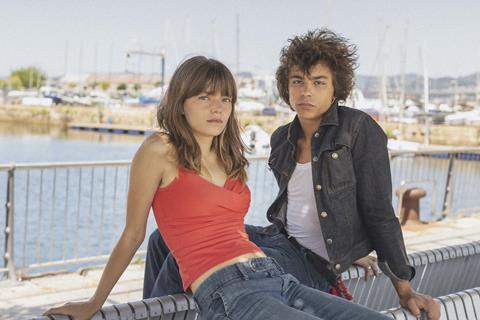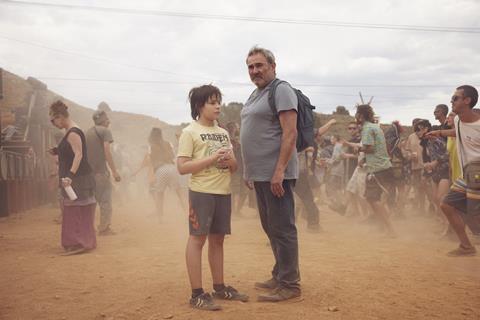Competition titles Romería and Sirat are spearheading the presence of the Spanish film industry at Cannes, with titles by rising filmmakers in sidebar sections and a market buzzing with fresh projects.

It was back in 2009 that two Spanish films, Pedro Almodovar’s Broken Embraces and Isabel Coixet’s Map Of The Sounds Of Tokyo, were selected for Cannes Competition. Sixteen years later and Carla Simon’s Romería and Oliver Laxe’s Sirat are both in the running for the Palme d’Or, heralding a new — though already well-established — generation of filmmakers.
Romería closes a thematic cycle that began with Simon’s previous features Summer 1993 and Alcarràs. The new film is an intimate exploration of Simon’s roots, shaped by her experience of losing her parents at an early age. “Romería departs from the naturalism of the first two films, which makes it truly special. It’s a Carla Simon we haven’t seen before — it will surprise people,” notes the film’s producer, Maria Zamora of Madrid-based Elastica Films.
Ambitious filmmaking
Laxe’s career has flourished on the Croisette, where all his features have premiered: You Are All Captains in Directors’ Fortnight 2010, Mimosas in Critics’ Week 2016 and Fire Will Come in Un Certain Regard 2019, where it picked up the jury prize.
A budget of around $7.3m (€6.5m) makes Laxe’s Sirat his most ambitious film to date. It is the story of a father, played by Cannes regular Sergi Lopez, who is searching for his daughter at a rave in Morocco’s desert landscape.
“Sirat has touches of a psychedelic road movie and spiritual western,” says Xavi Font, who runs Films Da Ermida with Laxe.

Font produced Sirat with El Deseo and Uri Films, as well as 4A4 Productions in France and secured backing from Movistar Plus+. The Madrid-based streamer has emerged as a strong new backer for Spanish films since moving into feature production last year.
“We support Spanish cinema, buying rights for about 40 features a year,” explains Guillermo Farré, head of original films and Spanish cinema at Movistar Plus+. “We are also involved in co-producing with independent companies. Sirat is an example of the latter and there are more to come. The idea is to release between four and six features a year.”
The Movistar Plus+ slate includes thriller Los Tigres by Alberto Rodriguez; The Black Ball from Javier Calvo and Javier Ambrossi (aka filmmaking duo Los Javis), which is inspired by an unfinished play by Federico Garcia Lorca; and The Beloved (El Ser Querido), starring Javier Bardem and directed by Critics’ Week jury president Rodrigo Sorogoyen.
“These are all features where the filmmakers’ creative ambition required a bigger investment than the normal average for independent cinema in Spain,” adds Farre. “We are delighted to help make them possible.”
Across the Croisette
Beyond the two films in Competition, the Cannes selection illustrates the scope of Spain’s indie production boom. Developed in Cannes’ La Résidence, Guillermo Galoe’s debut feature Sleepless City (Critics’ Week) tells the story of a proud teenage Roma boy who lives in Europe’s largest illegal settlement, on the outskirts of Madrid, with his family of scrap-metal dealers.
The Spain-France co-production is produced by Sintagma Films, Buena Pinta Media, Encanta Films, BTeam Prods, Les Valseurs and Tournellovision. Best Friend Forever has international rights, with BTeam Pictures releasing in Spain.
Elsewhere, Lav Diaz’s Cannes Premiere title Magellan is an international co-production on which Albert Serra’s Andergraun Films is the Spanish partner, along with El Viaje Films. Diego Cespedes’s The Mysterious Gaze Of The Flamingo plays Un Certain Regard and is co‑produced by Spain’s Irusoin.
Three short films by rising Spanish directors are also playing in the festival. Gala Hernandez Lopez’s +10k is in Directors’ Fortnight, while Marc Camardons’ The Sorceress Echo and Joecar Hanna’s Talk Me, executive produced by Spike Lee, are screening as part of La Cinéf.
“Spanish independent filmmaking is flourishing,” says Sirat producer Font. “It is honouring a tradition that goes back to Buñuel, and on to Almodovar.”

























No comments yet